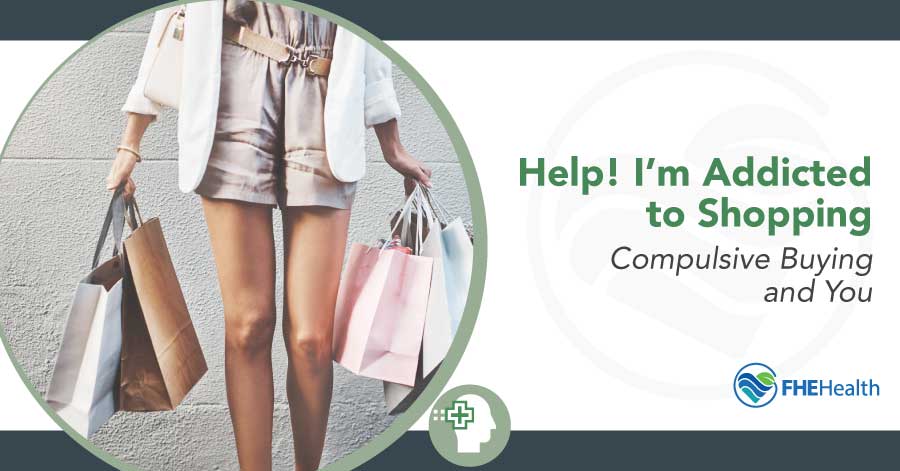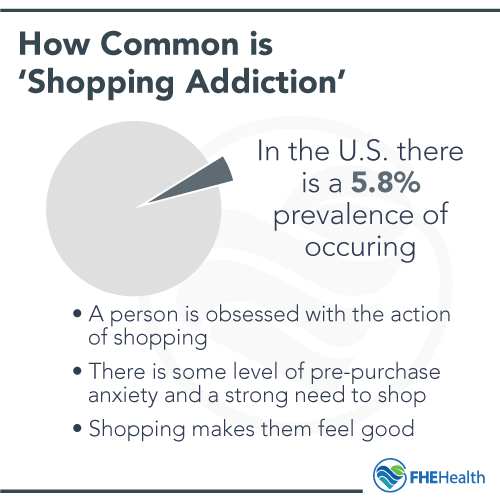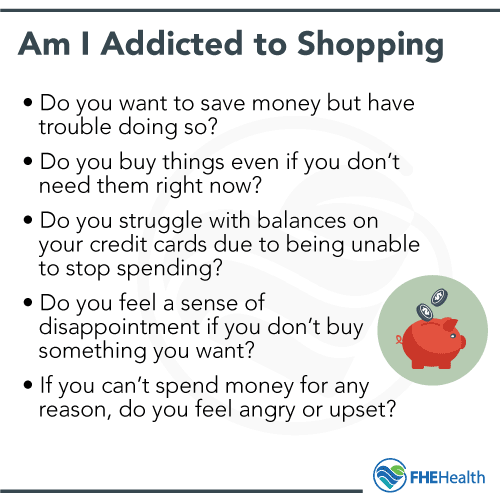
Can shopping become an addiction? Shopping without the ability to stop can be a form of addiction. Compulsive buying disorder is a disease. For some people, it begins as a need to have the latest item or fashion accessory. Over time, indulging in those items creates a positive feeling and compels a person to continue to engage in the activity. When it becomes uncontrolled, it may be an addiction.
A study published by the U.S. National Institutes of Health found that it has a lifetime prevalence of 5.8 percent. Those who have shopping disorders like this have a preoccupation with the process. They may have pre-purchase anxiety or tension, but they feel a sense of relief afterward. Compulsive shopping can lead to hoarding as well as unhealthy behaviors with the things purchased.
Shopping addictions can be overwhelming financially, and the person may feel as though they need to buy something because it is on sale, creating a build-up of unnecessary and often wasted items. Some people are embarrassed by these actions and develop social anxiety.
Shopping becomes an addiction when:
- A person is obsessed with the action of shopping
- There is some level of pre-purchase anxiety and a strong need to shop
- Shopping makes them feel good
Why Does Shopping Addiction Occur?
 It can be difficult to understand why you feel the need to shop so frequently. For some, especially when it comes to online shopping addiction, the underlying cause may be related to being bored or because it’s a distraction from day-to-day life stressors. It can also be related to a specific event in your lifetime. Still, others shop because it brings a sense of satisfaction — something they may be lacking in other areas of their life. Shopping helps drown out negative emotions you feel for other reasons.
It can be difficult to understand why you feel the need to shop so frequently. For some, especially when it comes to online shopping addiction, the underlying cause may be related to being bored or because it’s a distraction from day-to-day life stressors. It can also be related to a specific event in your lifetime. Still, others shop because it brings a sense of satisfaction — something they may be lacking in other areas of their life. Shopping helps drown out negative emotions you feel for other reasons.
Over time, shopping addiction can become severe, turning into uncontrollable spending that leads to anxiety, depression, financial suffering and a lack of self-control. Without help, you may develop other mental health disorders.
What Can Cause Shopping Addictions?
Like any addiction, there are many layers to why and how people become addicted to buying. Some people may use shopping for the emotional high. It feels good to have something new, and that feeling of treating yourself gives you an emotional boost when you’re struggling. Over time, some people might start self-medicating by shopping when they are upset, depressed or angry or have had a bad day.
Sometimes, shopping addictions start after a person has experienced a period in their life of not having enough. They may feel compelled to buy things that are on sale or that appear to be a “good deal” because they may need it at some point. They may not even ever wear or use the things they buy but keep them “just in case.”
It’s important to remember that a shopping addiction doesn’t have to mean that you’re going out to stores and physically buying things. Online shopping has made it easier than ever for people to buy just about anything from the comfort of their own home, and while this is a good thing if you can’t get out or need the convenience, it can be a slippery slope for those struggling with a shopping addiction.
Retail Therapy: It’s Not a Joke
It’s common to hear people talk about retail therapy. Your friends and family may even joke about purchases they’ve made and talk about being addicted to shopping as if it’s not a real struggle. If you’re someone who is struggling with a shopping addiction, this can be difficult to deal with and may make you feel like your problems aren’t legitimate. But this isn’t true.
There is a big difference between occasionally treating yourself and being addicted to shopping. People who are addicted to shopping are compelled to shop, and the idea of shopping or when they can next buy something may consume their thoughts and be the primary focus of their lives. Shopping addictions, just like substance abuse issues, often have a negative effect on the person’s personal relationships, career, and even quality of life.
Emotional Symptoms of a Shopping Addiction
Your mental and emotional health is directly tied to your behaviors, for better or worse. A shopping addiction can affect your thoughts and feelings in many ways, including:
- Feelings of being out of control, especially while shopping
- Feeling depressed if you are unable to engage in shopping
- Being angry or reacting intensely if someone stops you from shopping or questions whether your shopping is a problem
- Getting a high feeling while looking for items and/or after buying
- Feelings of remorse or regret after shopping
Do You Have a Shopping Addiction?
It’s hard to see when shopping has gone from being about frugal decisions to being an unhealthy habit. It’s always a good idea to speak to someone, such as a therapist, about your compulsive buying habits in an open, honest way. However, this questionnaire can provide a starting point to knowing when you need to seek out help.
 Answer the following questions honestly. Rate yourself in these areas carefully. If you think these things or take these actions all of the time, write that down. If you experience them just once in a while, note that. If you find yourself noting “almost always” or “all of the time” on more than two to three of these things, it may be time to speak to a therapist.
Answer the following questions honestly. Rate yourself in these areas carefully. If you think these things or take these actions all of the time, write that down. If you experience them just once in a while, note that. If you find yourself noting “almost always” or “all of the time” on more than two to three of these things, it may be time to speak to a therapist.
- Do you want to save money but have trouble doing so?
- Do you think about shopping very often? Do you think about needing to shop, wanting to shop, wanting to catch a bargain or looking for online deals?
- Do you buy things even if you don’t need them right now?
- If you have a bit of extra cash on hand, do you feel the need to spend it instead of saving it?
- Do you struggle with balances on your credit cards due to being unable to stop spending?
- Do you feel good when you find a good deal even when it’s not something you normally use or need at this time?
- If you become frustrated or upset, do you turn to shopping as a way to improve your mood or feel better?
- Do you engage in shopping as a way to wind down or have fun instead of hanging out with friends or family?
- Do you feel a sense of disappointment if you don’t buy something you want?
- Does more than one-third of your income go toward paying for non-expense-related debt, such as credit card bills?
- Do you have a lot of things in your home, many of which you really have no need for?
- Do you struggle to make payments on your mortgage or other debts because you’ve spent the money on other things, such as a shopping spree?
- Do you impulse buy, which may include making purchases of things just because you find them and it seems they are a good deal?
- If you can’t spend money for any reason, do you feel angry or upset? Do you feel like you have failed?
- Do you shop online a lot? For example, do you find yourself using online shopping sites just to find deals and discounts on items you do not need to have?
- Does your shopping habit lead you to other destructive behaviors such as hoarding or substance abuse?
If you have done two or three of these things with any consistency, you may be compulsive buying. While this isn’t a type of addiction that usually has health-related consequences, it can interfere with your relationships and financial health. Taking steps to get help is essential.
Other Disorders Commonly Linked to Shopping Addiction
It’s not uncommon for those with shopping addictions to also be struggling with other areas of mental and emotional health. Here are a few disorders that are commonly linked to shopping addiction.
- Depression: People who are struggling with depression may use shopping as a way to boost their mood, even if it’s only temporarily. However, this can also backfire, with feelings of depression being intensified after a shopping spree because of the regret or financial fallout, creating a vicious circle.
- PTSD: Those who have PTSD, especially if it’s related to childhood abuse or experiencing extreme poverty, may use shopping to improve their self-esteem or ensure they don’t ever have to lack for things again.
- Substance use: Someone struggling with any kind of addiction is automatically at higher risk for developing other substance abuse issues. In the case of a shopping addiction, someone may be more prone to out-of-control shopping when they are drunk or high. The emotional fallout after a shopping binge can also trigger feelings of guilt, shame and depression, which may cause some people to try to self-medicate with drugs or alcohol.
What Kind of Treatment Is There for Shopping Addiction?
If you or someone you love seems to be struggling with a shopping addiction, it’s important to know that help is available. Some treatment options include:
- Shopping rehab: While shopping addictions usually don’t require inpatient treatment unless there are other addictions or disorders happening along with them, there are outpatient services that can be helpful.
- Debtors Anonymous: Similar to Alcoholics Anonymous, DA is based on the 12-step system of admitting that the addiction is a problem and recognizing that you need help to overcome it. These support groups include sponsors and can help you feel supported in your recovery journey.
- Counseling: Shopping addictions often have underlying issues that need to be worked out to give you the best chance at long-term recovery. Working with a therapist who has experience counseling those with shopping addictions can help you form a plan that’s unique to your situation and issues.
How FHE Health Can Help with Shopping Addiction
If you think you have an online shopping addiction or any other type of addiction, it’s time to get help. With a debtors anonymous program or other forms of counseling, it may be possible to avoid some of the negative consequences. FHE Health treats a variety of compulsive-related conditions. Allow our team to help you.






